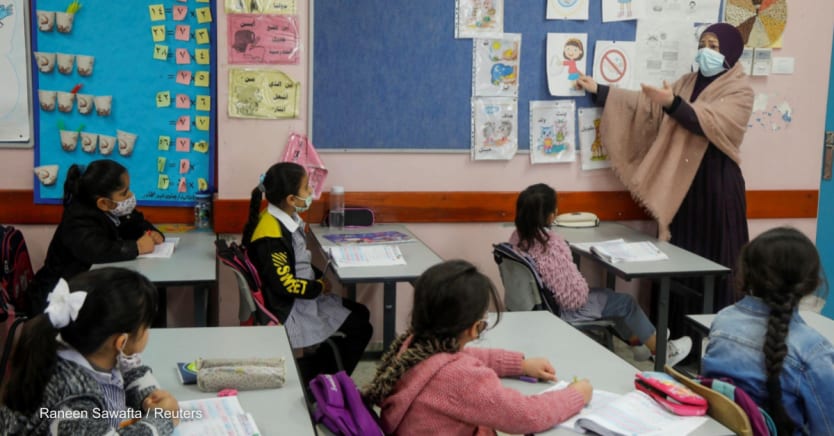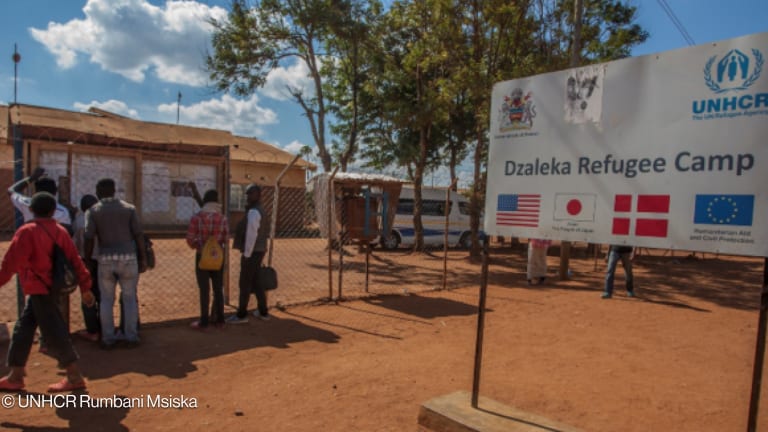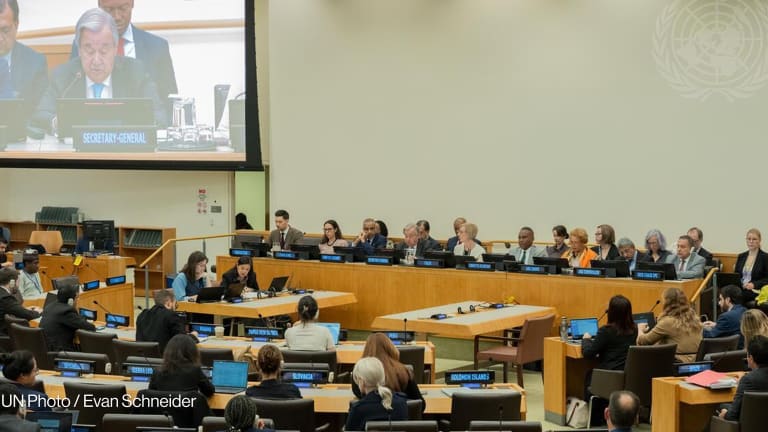
One of the default problems for the United Nations is that no rule states the need to fund the resolutions it votes for. Case in point: The agency that serves Palestinian refugees has wide support at the General Assembly, and its mandate is routinely renewed. Yet it is chronically underfunded and increasingly teetering toward the abyss.
The head of the U.N. Relief and Works Agency for Palestine Refugees in the Near East is worried. In an interview with Devex, Philippe Lazzarini repeatedly stressed that the agency, founded in 1949, is facing its most critical funding crisis in recent memory.
US resumes aid to Palestinians, but needs still outstrip budget
The State Department has announced that the United Nations Palestinian refugee agency will receive $150 million in humanitarian assistance.
Shifts in regional politics mean that once-stalwart funders, such as the United States and Persian Gulf nations, are no longer so reliable — even as the Middle East has been thrown further into turmoil over the past decade, leading to rising refugee needs. But the ramifications of UNRWA’s financial collapse would be dire for millions of people across the region and beyond, Lazzarini said.
“Unrest, violence, migration,” he said, listing possible outcomes.
“Our own resilience will come to an end. We are about to reach a tipping point,” Lazzarini said of the agency’s balance sheet. “We can suddenly wake up and it falls down like a house of cards.”
His plea to donor nations: To continue operating, UNRWA needs predictable and sustainable funding, ideally in the form of multiyear commitments. In short, it needs a total overhaul of its funding model.
Recently, Norway stepped in with a rare multiyear funding pledge worth $124.5 million over four years.
“I am deeply concerned about UNRWA’s financial situation,” said Anniken Huitfeldt, Norway’s minister of foreign affairs, as the country announced the plan last month. Lazzarini said this kind of donation is vital to keeping the agency solvent.
It’s also a huge sum: For comparison, the European Union, as an entity, donated $108 million to UNRWA in 2021.
Lazzarini added that the U.N. agency does more than just meet the humanitarian needs of refugees; it’s a linchpin of regional stability. Governments, he said, need to ensure a steady stream of financing for an organization whose mandate they renew every three years, with overwhelming numbers.
“The stated political support … it does not mean they walk the talk,” he said. UNRWA requested $1.6 billion from donors at the start of 2022. Its appeal for last year was only 70% funded, and so far donors have only met 20% of this year’s budget, according to the agency. Moreover, the organization started 2022 with a debt of $62 million.
In recent years, UNRWA’s deficits have been in the tens of millions of dollars, as funding levels have plateaued for a decade. Meanwhile, the organization — which has nearly 6 million registered refugees in the West Bank, Gaza, Lebanon, Jordan, and Syria — is facing increased demand for its services. More than 2.6 million of these refugees live in poverty, UNRWA says, and that figure is rising.
The civil war in Syria and the economic collapse in Lebanon came on top of the blockade of the Gaza Strip, which plunged the territory of 2 million people into a dire state of affairs that has seen a reversal of its international development measures. Jordan, for its part, has witnessed its economy shrink.
Worse still, the big donor states have been flip-flopping. The U.S. was a major funder, to the tune of $350 million annually, then totally ceased its support during former President Donald Trump’s administration. President Joe Biden has reversed the decision and restored U.S. funding to its historical levels in the year since he took office.
In addition, Gulf states that were long reliable donors have now turned. For example, Saudi Arabia gave UNRWA roughly $167 million in 2018. But in the most recent rankings, the oil-rich kingdom is not even among the top 20 donors. Without predictable revenue streams, the organization is struggling to deliver services.
“Our own resilience will come to an end. We are about to reach a tipping point.”
— Philippe Lazzarini, commissioner-general, UNRWAOne U.N. official, who was not authorized to publicly discuss finances, described UNRWA as a stool with three legs: the U.S., Europe, and the Arab states. Currently, it has two wobbly legs, with Europe being the only steady one remaining.
Khaled Elgindy, a senior fellow at the Middle East Institute, said that as Gulf states have normalized relations with Israel in recent years, there is an accompanying sense of “general fatigue” with the Palestinian issue and the refugees in particular.
“People have moved on and decided that this is no longer a priority,” Elgindy said. “There is no Palestinian state on the horizon — and a solution to the Palestinian refugee situation even less so.”
Still, he sees only risks from ignoring the Palestinian stiuation and underfunding UNRWA.
“Most students in Gaza are in UNRWA schools. So just imagine if these schools stop operating,” Elgindy said. “To take UNRWA out of the equation in Syria and Lebanon would make the situation there extremely dire.”
Lazzarini similarly pointed out the vast operations of UNRWA — from education, which makes up half of the organization’s core budget, to microloans and job creation.
“We provide government-like services,” Lazzarini said, in contrast to the mandates of most U.N. agencies and similar organizations, but UNRWA is increasingly being forced to “do more with less.”
Humanitarian relief in Gaza reaching a 'critical point,' UN rep says
While the Israel and Hamas conflict has halted all development work in Gaza, unreliable border crossings and security risks are also threatening the steady continuation of humanitarian work.
Hundreds of thousands of children are educated in UNRWA schools each year, and belt-tightening means class sizes have ballooned to 50 children in some cases. Medical services are similarly constrained, with doctors spending only a couple of minutes with patients. Lazzarini said it’s a “miracle” that all of its service centers remain open.
“We are an organization that never knows if we will have enough cash to continue our activities,” he said. The agency employs tens of thousands of people, many of whom are the main breadwinners for their families, in regions often bereft of steady, gainful employment.
Unlike a national government, UNRWA cannot borrow money. It stretches its funds by delaying payments to suppliers. And when all else fails, its workers — most of them refugees themselves — take the hit.
Last year, the agency warned employees that it could not pay salaries. Thousands of workers were put on unpaid leave. Donations that trickled in at the last moment prevented a massive strike.
Lazzarini, who officially took up his post in March 2020 — just as much of the world shut down amid the COVID-19 pandemic — is facing a slew of compounding problems to solve. He is often on the move, whether to drum up funds or visit UNRWA’s operations across the Middle East.
He sat down for the Zoom interview with Devex from Jordan before departing to Europe to ask for money for UNRWA.
He said he remains optimistic that donors will come through but also is cleareyed about the risk.
“We are in a danger zone,” he said. “Absolutely no doubt about it.”








